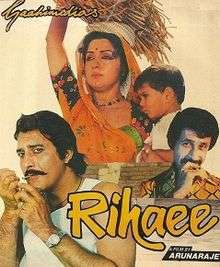Rihaee (1988 film)
| Rihaee | |
|---|---|
 Promotional Poster | |
| Directed by | Aruna Raje |
| Produced by | Aruna Raje |
| Written by |
Aruna Raje Suraj Sanim (dialogue) |
| Starring |
Vinod Khanna Hema Malini Naseeruddin Shah Neena Gupta Reema Lagoo Ila Arun Mohan Agashe Pallavi Joshi |
| Music by | Shaarang Dev |
| Cinematography | S.R.K. Murthy |
| Edited by | Aruna Raje |
Release dates | 31 August 1988 |
| Country | India |
| Language | Hindi |
Rihaee (Devnagari: रिहाई, English: Liberation) is a 1988 Hindi film directed by Aruna Raje, starring Vinod Khanna, Hema Malini, Naseeruddin Shah and Mohan Agashe in lead roles. The film dealt with the promiscuity of male migrant workers to urban India, and also the sexuality of women, left behind the rural regions.[1][2]
Hema Malini received a nomination for the Filmfare Best Actress Award for her role in the film [3]
Plot
The story is set in a remote village in Gujarat. Menfolk here, like in many other villages across India go to the cities to work, leaving behind their families.[4] Mansukh (Naseeruddin Shah) after working for a long time in Dubai, returns to his native village. This is the village where all the men have gone to work in the cities. The lonely women of the village are all excited with the arrival of Mansukh and many are after him. Especially Sukhi (Neena Gupta) and Reema Lagoo. Taku (Hema Malini) wife of Amarji (Vinod Khanna) is a woman with an attitude. She is an independent and strong women who is different from the group. Mansukh becomes interested in her and he goes after her. After his persistent attempts he succeeds & they start having a relationship.
After a while Mansukh leaves the village. The women Sukhi and Taku later find out that they are both pregnant. How they deal with their pregnancies is the movie.
This is a staggering movie that shakes some of the fundamental rules of Indian society. It talks about equal opportunity to females on all aspects. Unlike many directors who advocate for equal opportunity without much alteration of the current social setup, Aruna talks about giving those opportunity, even if it means changing the basic rules of the current social setup.
The movie starts almost like a soft porn. I was wondering how a women director like aruna raje has taken a movie like this, the movie turned around and became a strong women's liberation voice.
The movie starts with the introduction of the village characters through a postman (Harish Patel). Later,the movie targeting the men folks on their attitude towards women, hooks them with a common man's dream story. A man in a village filled with longing women. Then it slowly turns and constructs through various threads to tell how women is differentiated in the eyes of the society, what a baby means to a woman and what is real manliness.
The movie has many small threads and uses many characters. But none of the characters are unimportant, every small character deals with different issues to tell the plight of the women. Aruna's screenplay should be commended for the way it integrates all the issues with Takku's problem as the central point.
Jhumkhu(Ila arun) for example loses her son in a fire accident and is forced to do the funeral without her husband, as he is not able to come to the village. She goes through that trauma all alone. She almost becomes insane on that loss, this character is later used to convey the message that whether it is an accident or an abortion, the trauma of losing a child for a woman is the same. Like Jhumku there is a story behind every female character, and they have one problem or the other because of the fact that they are a woman.
The movie clearly puts the double standard followed for men and women through various village characters. Mansukh's father in the panchayat blames the women of the village to be punished, without saying anything about his son who was responsible for everything. The movie also points out the hypocrisy of the society which says it is ok to hide the truth rather than reveal it openly.
Cast
- Vinod Khanna : Amar Ji
- Hema Malini : Taku
- Naseeruddin Shah : Mansukh
- Neena Gupta : Sukkhi
- Ila Arun : Jhumku
- Harish Patel : Narrator/Raoji Bhai (Postman)
- Mohan Agashe : Roop Ji
- Reema Lagoo : Mother of 2 Boys
- Aditya Lakhia:
- Sangeeta Naik : Special Appearance
- Pallavi Joshi : Special Appearance
- Hilla Sethna : Special Appearance
- Robin Gupta : Special Appearance
- Aditya Bhattacharya : Special Appearance
References
- ↑ Shoma A. Chatterji (1998). Subject cinema, object women: a study of the portrayal of women in Indian cinema. Parumita Publications. p. 131.
- ↑ Anjana Sharma (2002). Translating desire: the politics of gender and culture in India. Katha. p. 76. ISBN 818764933X.
- ↑ "The Nominations - 1990- The 51st Filmfare Awards". Filmfareawards.Indiatimes.com.
- ↑ "Alternate Movies: Rihaee-1988(Liberation)". Parallelcinema.blogspot.in. 2005-09-26. Retrieved 2012-05-14.
External links
- Rihaee at the Internet Movie Database